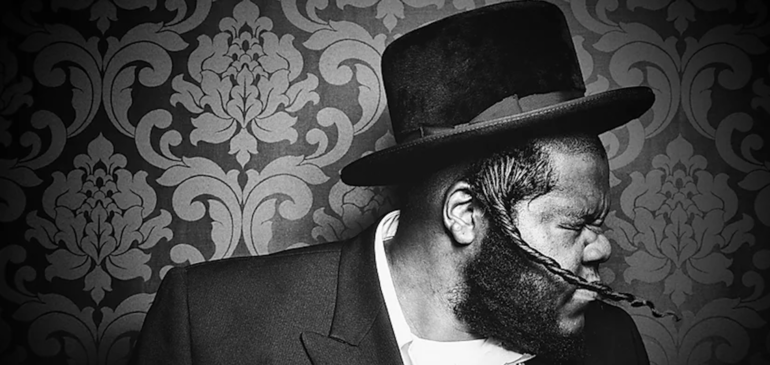
Nissim Black Weighs In On Black And Orthodox Jewish Tensions
To hear Allison Josephs’s full-length interview of Nissim Black on her podcast, please click here.
In the face of anti-Semitic attacks perpetrated by African-Americans, the current mood for Orthodox Jews of Color is one of fear, discomfort and shame. Rapper Nissim Black discussed his views on the current situation. “It’s been very troubling for me and my family and close friends…we have a group of guys that are African-American gerim. We’re trying to rack our brains, trying to figure out what we can do, talking to rabbeim. Trying to figure out how to be.” During the Siyum HaShas, Black says, “I had no pleasure in that at all. I was busy with this inyan, talking to people, trying to figure out what it is that I can do.”
For Black and his friends, in addition to already being ostracized as religious Jews of color, he is now villainized too. “It’s a very, very uncomfortable feeling…In my circles, I’m almost always the only person of color there. A friend of mine was in New York and said ‘I’m scared to go to a shul.’ He’s an erliche yid but he doesn’t know if he feels safe going to a shul.”
A few years ago, Black had not yet experienced racism within the Orthodox Jewish community. “If you let it sit for long enough, then you can definitely have experiences that you’d rather not share.” Black and his wife recently moved from Yerushalayim to Beit Shemesh. “My kids remember going to the park in Mea Shearim and all the kids would clear out. They would have the whole park to themselves.” This caused them tremendous pain. But not everyone is like that. “One time I was walking in Mea Shearim and one guy stopped me and said, ‘ You should know, 99% of the oilam is behind you.’ And…that’s how I feel.”
Black grew up in a Jewish neighborhood on the West Coast, where “once in a while they called the police on us, but we probably deserved it [because our music was too loud].” While Black’s immediate family never had any problems with Jews, he remembers his aunt saying that the Star of David was the Star of Satan. “She had no idea what it actually meant…Of course there are extremist groups that are really pushing it,” but Black sees that most of the “hate” from African Americans towards the Jews is based on ignorance. “A lot of things are misinterpreted and because there’s no open dialogue. I was once in Long Beach and the Chabad rabbi there had built up a very good relationship with the [Martin Luther King Jr-inspired] Boys and Girls club.” Black realized that this could be a model for other communities across the world. “The unification and the love and mutual respect that I [saw] there was absolutely amazing.”
Black’s position is unique; he has insight into both the black and Jewish communities. “Being able to be on both sides, there is a lack of education on both sides.” Black has met young Orthodox Jewish boys who have no idea about the African-American experience. Similarly, Black didn’t hear about the Holocaust until he was becoming a Jew. “We don’t even know each other’s struggles. We don’t even know things that each side has gone through. I think that once those things are talked about in a dialogue, then it can help people move past a lot of the differences.”
Black has struggled with African Americans treating him as if he is a traitor for “switching sides.” There is negativity towards the Jewish community in some circles and it is there that Black encounters the most resistance. From Black’s own Seattle home community, “the love and respect has been overwhelming…My father was a pastor, a doctor, a theologian who teaches at a Bible college, he is very pro-Israel, very pro-Jews.” While building an alliance with black churches might be a good start, because Black is disconnected from that community, he isn’t 100% sure that this would be successful. He says, “we need all the help we can get from whoever to start speaking out and saying something about it.”
Orthodox Jewish people of color need extra compassion at this time, especially from other Orthodox Jews. “If people made the decision to become Jewish, or their parents were gerim or grandparents were gerim, they need to be treated just like every other person…” Black notes that the way we treat others has the greatest impact on our current situation. “Sinas Chinam. We don’t have a Beis haMikdash right now because of that type of behavior.”
To him, the shared experiences of Blacks and Jews could be the starting point to bridge the gap. “There’s so much to learn.” Black draws the comparison between African American Slavery and the difficult times in Jewish history: the Shoah, Pogroms, the Inquisition and Mitzrayim. While he feels that African Americans can and should let go of victimhood, “All of Yiddishkeit is built off of remembering what Mitzrayim was like… those trying and hard times. We may joke about it, and drink and eat after remembering that something happened, but it’s all about remembering.” The African-American community could also remember without being a victim. “They could look up to the Jewish community in how to look forward… from a tumultuous past.”
Black is excited about his next song which discusses being black and Jewish being released on January 31. The video is set in Harlem. “It wasn’t planned but it just happened to be that this song is being released soon. We want to run with that campaign and see if we can push initiatives to try to bring more conversations to the table on how to bring peace between the two communities.”
Photograph by Marko Dashev
If you found this content meaningful and want to help further our mission through our Keter, Makom, and Tikun branches, please consider becoming a Change Maker today.








1 comment
Sort by
It’s also important to remember that not every Jew of color is a ger or descended from one. (and not just talking about Ethiopia.) There are many many of us that don’t fit neatly in the Askenazi or Separdi, Mizrahi label, many of us are a mix of many cultures.